In a recent article, we saw that spending time in a forest can improve health, by lowering stress and improving immune function. Could similar exposure to natural settings, such as actual contact with the earth, also improve health? Contact with the ground is known as earthing, and earthing could have profound health benefits.
Earthing, or grounding, refers to putting the human body into deliberate contact with the ground, or the earth.
Earthing can be done in a number of ways, such as
- barefoot contact with the ground
- sleeping in a bed with special conductive sheets that are wired to the ground
- attaching small pieces of conductive metal to the body and attaching them by wire to the ground
If all of this comes off to you as odd, as way-out-there New Age shamanism, you’re not alone, as I have a severe allergy to anything New Age. But there’s solid scientific evidence that it works.
How earthing works
The earth has an unlimited supply of electrons, which are continually replenished by atmospheric forces such as thunderstorms. (At any moment, thousands of thunderstorms are active across the planet.)
By coming into contact with the ground, electrons enter the body, and the body almost instantaneously assumes the same electrical charge as the earth.
The human body, like all organisms, has an electrical component, and a disturbance in it may cause biological systems to function poorly. The proper function of enzymes and other molecules, for example, depends hugely on electrical charges of their constituents, such as amino acids, as well as the pH of their surroundings. Electrical charges are also important at the organ level, for example in the heart and brain.
If we are insulated from the ground, as we are a great deal of the time, it stands to reason that biological systems may not function properly.
If all organisms, including humans, evolved under conditions that featured intimate contact with the earth, then our biological systems would be optimized for those conditions.
Hence our modern lifestyles could be making us sick by depriving us of earth contact.
One can look at earthing as just a specialized example of a paleolithic lifestyle: just as paying attention to the food and exercise we evolved with can yield many health benefits, being in contact with the earth as our ancestors were could also.
The zeta potential of red blood cells
A great example, because it’s simple, of how grounding can affect our physiology lies in the zeta potential of red blood cells.
The zeta potential refers to the negative charge on each red blood cell, which is caused by the molecular components on its surface. See the illustration below.

The zeta potential means that red blood cells are repelled from each other, since like charges (positive or negative) repel each other. A lower zeta potential allows RBCs to come closer to each other, and this increases blood viscosity (thickness). A higher zeta potential decreases blood viscosity.
Grounding immediately and substantially increases the zeta potential of red blood cells.
The subjects in this study were grounded by attaching conductive patches to the soles and palms of their feet, and these were wired to the ground. They did this for two hours.
Zeta potential greatly rose and blood viscosity decreased. Of interest, the apparently healthiest people had less increase in zeta potential than the apparently unhealthiest.
How important is blood viscosity for health? The authors of this study write:
A meta-analysis evaluating the connection between blood viscosity and CVD [cardiovascular disease] demonstrates clearly that the risk of major cardiovascular events increase with higher blood-viscosity levels. In the Edinburgh Artery Study, a population of 4860 men 45–59 years of age was observed for 5 years. The 20% of the men with the highest blood viscosity had a 3.2 times greater risk for cardiac events, compared with the 20% of men with the lowest blood viscosity. Fifty-five percent (55%) of major cardiovascular events occurred in the highest blood-viscosity group versus only 4% in the lowest blood-viscosity group.
If earthing had the potential to move a person into the lowest category of blood viscosity, then it would seem to also greatly decrease the risk of cardiovascular disease.
Grounding decreases stress hormones, muscle soreness
Cortisol is a necessary hormone the amount of which rises and falls with a circadian rhythm, and can become dysregulated in cases of illness or stress.
Grounding can normalize cortisol levels.
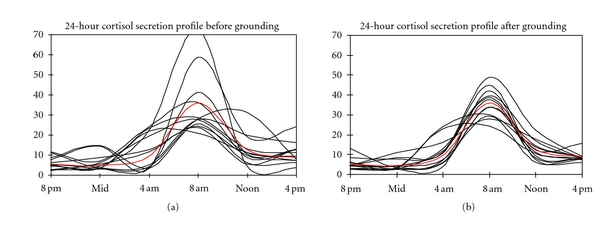
The graphs above show cortisol levels before and after 6 weeks of sleeping on a grounded bed. Each line represents one person. (Reference.) As with the zeta potential, it appears that those with an abnormal level or rhythm of cortisol had the most change.
Grounding also decreases inflammation and delayed-onset muscle soreness (DOMS) after weight lifting. See chart below – same reference as above.
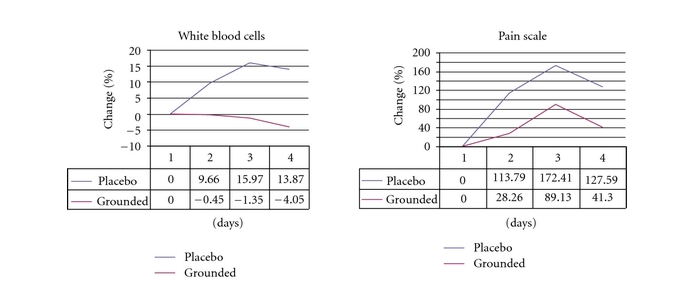
Other indicators that grounding affects include:
- increased heart rate variability – that’s a good thing
- improvement in glucose metabolism
- increased immune response
Bottom Line on Earthing
Earthing, or grounding, is, to say the least, intriguing.
How great a potential for improving health does it have? At this point, that’s very hard to say, but the experiments show great improvements in some important health markers.
Besides the experiments, anecdotal reports of improved health with grounding exist.
Many of the studies on earthing have been done by Gaetan Chevalier, who has been a professor at the University of California, Irvine, and is now at the UC San Diego School of Medicine. He has a PhD in engineering physics from the University of Montreal. I mention him and his qualifications because of the suspicion that this is all too New Age to be true, and because I’m forced to take much of the research at face value. Another proponent of and researcher into earthing is Stephen Sinatra, M.D., who is at the University of Connecticut Medical School.
Much more research needs to be done to establish degree of health effects, whether it works in all cases, on whom, and for what.
Increasing earth contact
The most obvious way to increase earth contact is by going barefoot, but the drawbacks are obvious, such as cold, sharp objects, inconvenience, etc. (When I was a kid, I went barefoot all the time, and I was healthy. Coincidence?)
Rubber soles on shoes are insulating and prevent electrical contact with the earth. Pretty much everyone wears shoes like this in some for or another. Leather shoes could allow more grounding.
There are various products that allow grounding, such as bed sheets and mats.
PS: On how to get healthy, see my books Muscle Up and Dumping Iron.
PPS: You can support this site by purchasing through my Supplements Buying Guide for Men. No extra cost to you.
[thrive_link color=’blue’ link=’https://www.subscribepage.com/l6x7w5′ target=’_blank’ size=’medium’ align=’aligncenter’]Subscribe and get my free book on fat loss[/thrive_link]

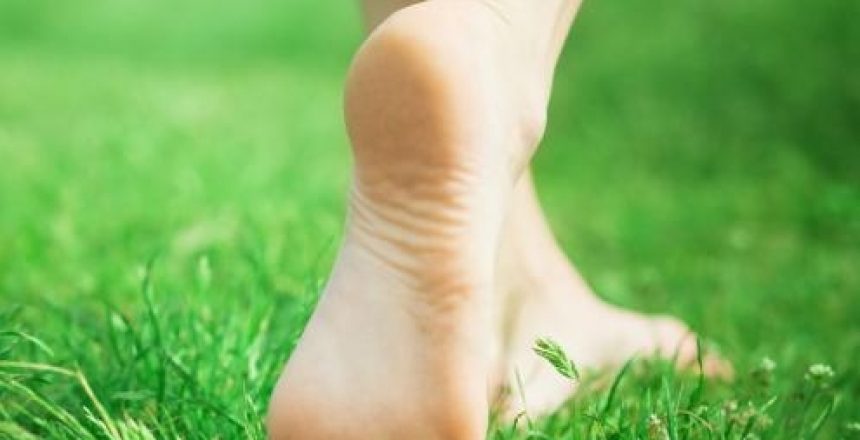
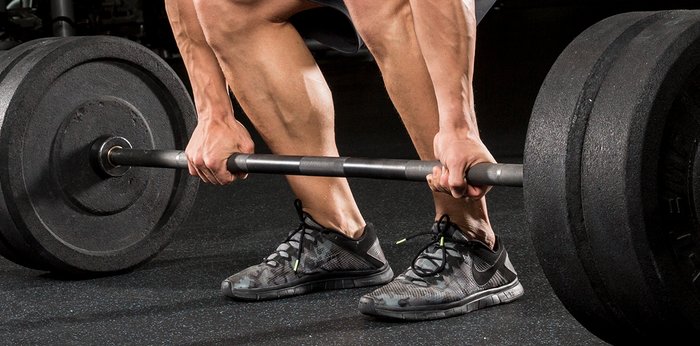
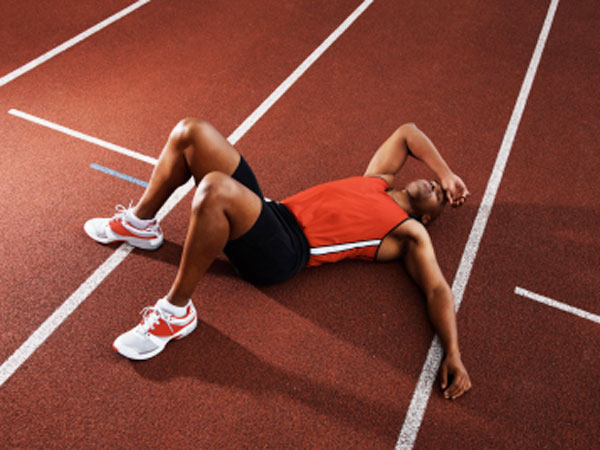


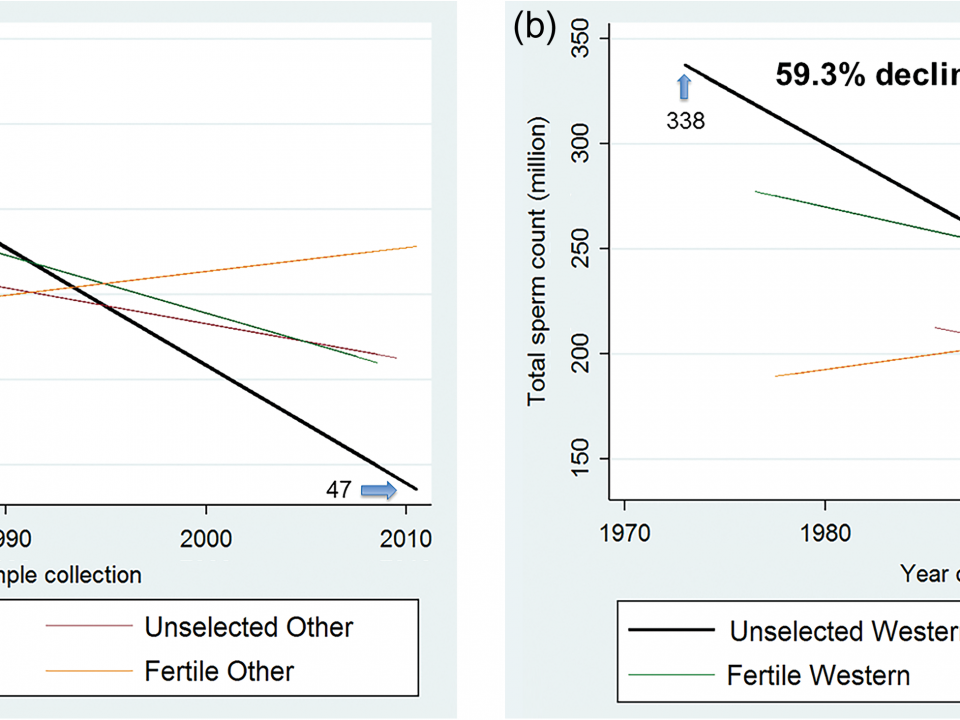



8 Comments
I’ve read about this before, and noticed a sensible change in overall relaxation of the body when I took advantage of a nice back yard in my last house, going barefoot each morning (while I got my UV radiation to set my bio clock, of course!). I also believe it’s one of the things that makes the beach so relaxing. Standing neck deep in the ocean can be incredibly relaxing, and it could be partially because of similar reasons.
My question is, what counts as “earth”?
Now I live on the 24th floor of a building with nothing but urban jungle for blocks around. It’s not practical to find actual grass or dirt on a regular basis (sad as that sounds). Do wood floors count? (Guessing not). What about the difference between artificial grass-planted areas (real grass growing in a bed of dirt only a few inches deep because there’s a parking garage or water pipes or whatever beneath it)? Is the grounding effect minimized because it’s not really in deep contact with the earth?
Thanks for writing this blog, Mangan. It’s the *best* practical health blog out there.
Daniel, thanks for saying that bit at the end there. As to your questions, thy’re good ones and I’m afraid I don’t have many answers. Hopefully someone with some electrical knowledge can weigh in. Wood is of course insulating, but concrete and asphalt, I don’t know – hoping they’re not.
Now I feel silly for bringing up wood, haha. Goes to show how easy it is (for some of us, apparently!) to slip into pseudo-sciencey wishing-it-were-so. “Wood = natural material, ergo good.”
Nevertheless the whole subject does strike me as one of those intersections where folk wisdom and wives’ tales probably intersects with provable science, if only the proper research would be done, like you’ve demonstrated amply with the case of iron/blood-letting.
For instance, my concrete megalopolis is in a country where good, professional massage can be had dirt cheap, so I avail myself of it often. In addition to the more proven benefits of massage related to blood-flow etc, I’ve often felt that the touch of certain masseuses is inherently relaxing and “grounding.” The New Agey way to put this is, “she has good energy.” But perhaps it’s just a (literally) well-grounded person who’s balancing out my electrons! Surely there’s an element of wishful thinking and confirmation bias here (“I feel good, therefore the science of my theory must be true”), but I wouldn’t be surprised if there’s actually something to it.
If there’s anything to this, I think it would show up in statistically significant results for people that work in industries where grounding is important or unavoidable. Unfortunately, everything that comes to mind have confounders galore:
occupation/confounder
semi-conductor fab / clean rooms
electronics assembly / solder flux fumes, heavy metals
inland merchant marine / swing shifts, rowdy after-hours social culture
commercial fishermen / swing shifts, rowdy, atypical diet — high in fish?? Pre-packaged & processed food when at sea??
lumber jacks / hard, physically demanding work, rowdy
forest rangers / too many environmental variables in addition to electrical grounding
coal miner / heh
pepper picker / double heh
I reckon what you’d have to do is compare professions that are otherwise the same: concrete guys to dry-wall installers, but again I can’t think of many that are comparable except for dry-indoor/wet-outdoor work.
Growing up in Australia, I went barefoot during most of my free time until I was in my teenage years. I’m kind of ashamed of how soft my feet are these days.
One big question might be how long it takes for your body to rebuild a “harmful” level of charge after grounding. Since grounding is almost instantaneous, is it enough just to touch or sit on the ground periodically while (say) out walking the dogs?
I grew up in Oz but never went barefoot because of the fscking bindi grass.
It seems to me that walking outside, barefoot, on the grass, for a few minutes each day (like when I walk my dog) is an easy low-cost way to get at least some of these benefits.
I’m not sure what to think on this whole earthing business. It seems that all the studies I’ve seen on it were funded by “Earth FX” — a company that I believe sells those earthing mats. Doesn’t mean that the results can’t be valid, but it increases my skepticism. Also, most of them didn’t have control groups, so the improvements subjects saw could conceivably be placebo effect.
On the other hand, it’s potentially a low/no-cost method of improving health that has a seemingly plausible basis. I’d like to see some more studies that aren’t funded by companies selling earthing paraphernalia, but in the meantime, I try to remember to take my shoes off when I have the chance to stand on some grass.